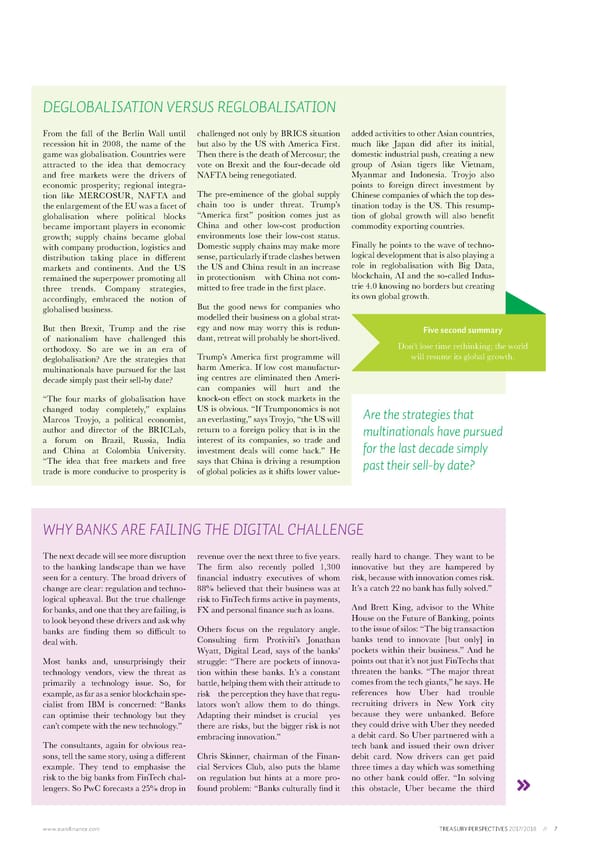DEGLOBALISATION VERSUS REGLOBALISATION From the fall of the Berlin Wall until challenged not only by BRICS situation added activities to other Asian countries, recession hit in 2008, the name of the but also by the US with America First. much like Japan did after its initial, game was globalisation. Countries were Then there is the death of Mercosur; the domestic industrial push, creating a new attracted to the idea that democracy vote on Brexit and the four-decade old group of Asian tigers like Vietnam, and free markets were the drivers of NAFTA being renegotiated. Myanmar and Indonesia. Troyjo also economic prosperity; regional integra- points to foreign direct investment by tion like MERCOSUR, NAFTA and The pre-eminence of the global supply Chinese companies of which the top des- the enlargement of the EU was a facet of chain too is under threat. Trump’s tination today is the US. This resump- globalisation where political blocks “America first” position comes just as tion of global growth will also benefit became important players in economic China and other low-cost production commodity exporting countries. growth; supply chains became global environments lose their low-cost status. with company production, logistics and Domestic supply chains may make more Finally he points to the wave of techno- distribution taking place in different sense, particularly if trade clashes betwen logical development that is also playing a markets and continents. And the US the US and China result in an increase role in reglobalisation with Big Data, remained the superpower promoting all in protectionism – with China not com- blockchain, AI and the so-called Indus- three trends. Company strategies, mitted to free trade in the first place. trie 4.0 knowing no borders but creating accordingly, embraced the notion of its own global growth. globalised business. But the good news for companies who modelled their business on a global strat- But then Brexit, Trump and the rise egy and now may worry this is redun- Five second summary of nationalism have challenged this dant, retreat will probably be short-lived. Don’t lose time rethinking; the world orthodoxy. So are we in an era of Trump’s America first programme will will resume its global growth. deglobalisation? Are the strategies that harm America. If low cost manufactur- multinationals have pursued for the last ing centres are eliminated then Ameri- decade simply past their sell-by date? can companies will hurt and the “The four marks of globalisation have knock-on effect on stock markets in the changed today completely,” explains US is obvious. “If Trumponomics is not Are the strategies that Marcos Troyjo, a political economist, an everlasting,” says Troyjo, “the US will author and director of the BRICLab, return to a foreign policy that is in the multinationals have pursued a forum on Brazil, Russia, India interest of its companies, so trade and for the last decade simply and China at Colombia University. investment deals will come back.” He “The idea that free markets and free says that China is driving a resumption past their sell-by date? trade is more conducive to prosperity is of global policies as it shifts lower value- WHY BANKS ARE FAILING THE DIGITAL CHALLENGE The next decade will see more disruption revenue over the next three to five years. really hard to change. They want to be to the banking landscape than we have The firm also recently polled 1,300 innovative but they are hampered by seen for a century. The broad drivers of financial industry executives of whom risk, because with innovation comes risk. change are clear: regulation and techno- 88% believed that their business was at It’s a catch 22 no bank has fully solved.” logical upheaval. But the true challenge risk to FinTech firms active in payments, And Brett King, advisor to the White for banks, and one that they are failing, is FX and personal finance such as loans. House on the Future of Banking, points to look beyond these drivers and ask why to the issue of silos: “The big transaction banks are finding them so difficult to Others focus on the regulatory angle. deal with. Consulting firm Protiviti’s Jonathan banks tend to innovate [but only] in Wyatt, Digital Lead, says of the banks’ pockets within their business.” And he Most banks and, unsurprisingly their struggle: “There are pockets of innova- points out that it’s not just FinTechs that technology vendors, view the threat as tion within these banks. It’s a constant threaten the banks. “The major threat primarily a technology issue. So, for battle, helping them with their attitude to comes from the tech giants,” he says. He example, as far as a senior blockchain spe- risk – the perception they have that regu- references how Uber had trouble cialist from IBM is concerned: “Banks lators won’t allow them to do things. recruiting drivers in New York city can optimise their technology but they Adapting their mindset is crucial – yes because they were unbanked. Before can’t compete with the new technology.” there are risks, but the bigger risk is not they could drive with Uber they needed embracing innovation.” a debit card. So Uber partnered with a The consultants, again for obvious rea- tech bank and issued their own driver sons, tell the same story, using a different Chris Skinner, chairman of the Finan- debit card. Now drivers can get paid example. They tend to emphasise the cial Services Club, also puts the blame three times a day which was something risk to the big banks from FinTech chal- on regulation but hints at a more pro- no other bank could offer. “In solving lengers. So PwC forecasts a 25% drop in found problem: “Banks culturally find it this obstacle, Uber became the third www.eurofinance.com TREASURY PERSPECTIVES 2017/2018 // 7
 Who's Running the Treasury? Page 6 Page 8
Who's Running the Treasury? Page 6 Page 8